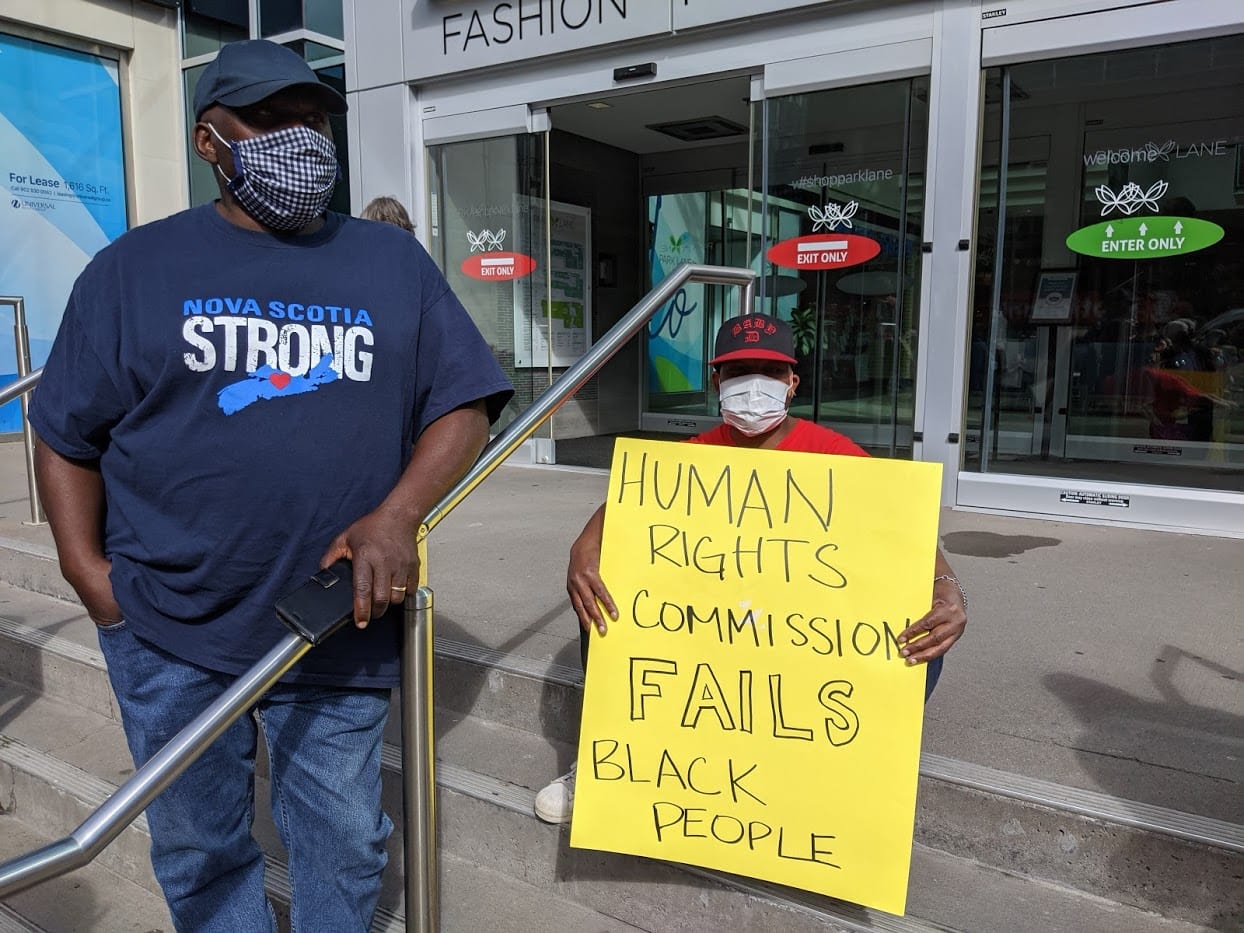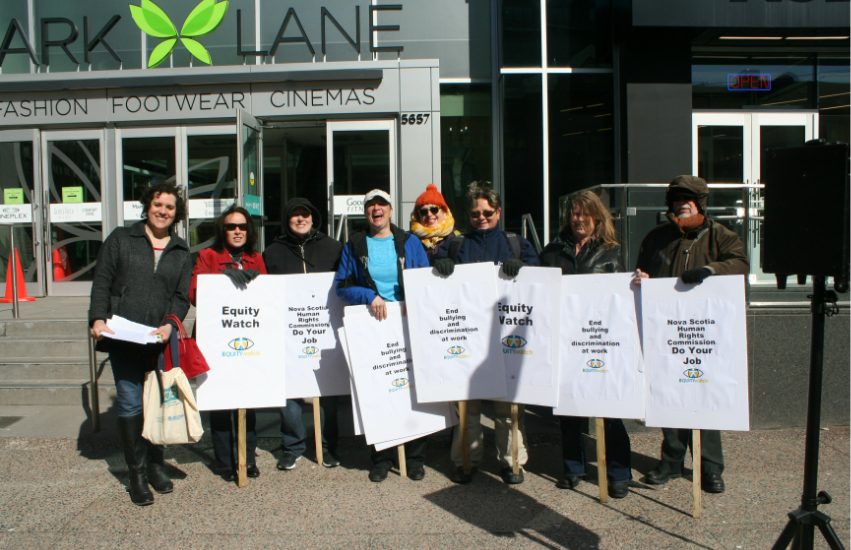
KJIPUKTUK (Halifax) – Equity Watch, the membership-based organization that fights workplace bullying and discrimination, is asking for fundamental changes in the way human rights complaints are dealt with in Nova Scotia.
The organization calls for structural changes to the Nova Scotia Human Rights Commission (NSHRC) to deal with the many complaints about its fairness and timeliness that have been raised over the years. The organization lays out its critique and recommendations in Justice Impeded, a well-researched and detailed 50-page report that was launched through a virtual press conference this morning.
Among the many issues the report identifies are a lack of a proactive pursuit of cases of systemic discrimination, a lack of follow up once remedies have been assigned, insufficient staffing and funding, inordinately long and sloppy processes, and a lack of legal support for complainants.
As well, the report finds that the NSHRC is too eager to settle disputes, relies too much on anti-bias training as a remedy, and is overly fond of non-disclosure agreements.
Liane Tessier: “Some might argue that my case had a happy ending, we would argue the exact opposite”

The launch was timed to coincide with the three-year anniversary of the Liane Tessier human rights case. Tessier is the firefighter who, after being harassed by male colleagues and supervisors, had no choice but to take the Nova Scotia Human Rights Commission (NSHRC) itself to court in order to finally receive a modicum of justice.
“Some might argue that my case had a happy ending, we would argue the exact opposite,” said Tessier, who spoke at the press conference.
HRM apologized and agreed that systemic discrimination had occurred. The municipality also committed to making structural changes, but neither HRM nor the NSHRC have ever replied to Tessier’s requests for some kind of progress report.
Tessier doubts that HRM and Halifax Fire followed up on the majority of recommendations they committed to. She has no way of knowing, because neither organization ever responds to her requests for an update, she says.
“To my knowledge, none of the perpetrators have been disciplined. Indeed, most of them have been promoted. Ironically, my victory has actually made it harder for complainants. The Commission mishandled my case so badly that now, when complainants go to judicial review, the Commission’s lawyers use my case as a test case against them. Arguing so to speak, you’re not being treated as badly as Tessier was, so you have no case, now go away,” Tessier said.
Connor Smithers-Mapp: “That rally was precipitated by the frustration that the Black community and others have with the Human Rights Commission”
Connor Smithers-Mapp, a Black lawyer associated with Equity Watch, referenced last summer’s rally by Black Nova Scotians protesting the way the Commission mishandled many of their complaints.
See also: Black human rights matter: Rally calls for shake-up of the Nova Scotia Human Rights Commission
“That rally was precipitated by the frustration that the Black community and others have with the Human Rights Commission. Specifically, people have lots of complaints around human rights officers not returning calls or emails or texts and generally being dismissive of complaints,” Smithers-Mapp said.
Only five cases per year on average make it to the tribunal stage, and way too many cases are dismissed before resolution, he said. “And unless you have a lawyer, once the Commission says that they’re not going to handle your case, you are out of luck.”
Smithers-Mapp also focused on the inadequacy of remedial actions such as mandatory anti-bias training and diversity education for staff.
“There is no evidence that these approaches are effective. The focus should be on what I call the three P’s, processes, policies and procedures, the kinds of tangible, substantive efforts that can be measured and actually make a change,” he said.
See also: Unions, management and councillors must be held accountable on workplace racism, says lawyer
Larry Haiven: “These non-disclosure agreements are basically gag orders”

So what would a refashioned human rights system in Nova Scotia look like?
Larry Haiven, a member of the Equity Watch steering committee, spoke about a new model based on how Ontario deals with human rights complaints.
That model sees a Human Rights Commission, a tribunal, and a legal support office operate in tandem but at arms length. The commission would focus on education and policy matters, the tribunal would deal with complaints, and the legal support office would support complainants from a legal perspective and pay legal costs, something that is not available in Nova Scotia and forces people like Tessier to pay for expensive lawyers herself.
Also noteworthy is that the tribunal would always provide a complainant with a hearing, no complainant is ever denied “their day in court” in some way or another.
This model and approach was brought in precisely because of problems similar to those present in Nova Scotia, Haiven said.
Equity Watch also wants the NSHRC to abandon its fondness of restorative justice approaches and non-disclosure agreements. These restorative approaches may have a place in the criminal justice system, but they are inappropriate when dealing with large corporations, landlords and governmental organizations, with lots of money and armies of lawyers, Haiven argued.
“These non-disclosure agreements are basically gag orders. Close to one third of accepted cases are settled by private agreement among the parties. If two of the main purposes of a human rights regime are public education and general deterrence, then a gag order renders the settlement route absolutely useless,” said Haiven.
Read a brief summary of the report recommendations here.
With a special thanks to our generous donors who make publication of the Nova Scotia Advocate possible.
Subscribe to the Nova Scotia Advocate weekly digest and never miss an article again. It’s free!




The Human Rights Commission should be renamed We Do Not Treat Human’s Right Commission. Individuals go to Human Rights as a last resort after all other efforts to find answers and justice have failed. They expect that an organization called Human Rights should be a safe space for citizens encountering racism or other serious human rights issues. Unfortunately is not a safe space. The Human Rights Commission mostly makes people’s lives worse, often much much worse. The Commission favours perceived power and rarely stands up and fights the fight for citizens. Cases are dragged out for years with no real proper investigation. Many people who go to Human Rights, then have to engage a lawyer to try to get Human Rights to do their job. I would be inclined to abolish the Commission and replace it with something which functions…with in the year. Change can happen quickly and for the better. These systemic problems have been in the organization for years even decades.
I have a case with the NSHRC that initially started back in 04-2017. I supplied them with all the information including
documents, photos, electronic mail/written, legal text and other forms of correspondence. Initially they were reluctant
to take on the case and I literally had to educate them on their own jurisdiction in the matter. Since 2017 very little if
anything has been COMPLETED from my perspective. I had an officer who was sick much of the time, therefore little
has been done in reality. Now last week (3-16-2021) I received a call from the commission (officer who was looking after
my case) to let me know he was no longer associated with my case. He gave me a name of another person who will take
over my case. Since this contact I have had no correspondence of any form from the NSHRC!!!! FOUR YEARS has passed
and I feel I am still at the stage one with the NSHRC.
To say I am perplexed cannot even come close to my frustration. I have SUPPLIED them with all the above documents and
etc. to lessen their workload. This included legal text(6 pages) from my lawyers laying out the legality of my case. I have written correspondence from the perpetrators own office in support of my case. Also letters from others who have gone through similar
treatment by this organization. They were so put off that they finally stopped any challenges to their cases. ie. How can an organization
lose a personal application three times??? They must have figured I would just go AWAY like others before me!!!
NOTE: Racial remarks including the n-word used at public meetings.
All information is documented and not challenged by the perpetrators as of today.(03-25-2021)
I am in process of possibly taking the NSHRC to court for their total of professionalism. This has caused me much anxiety and
frustration. I feel like I am being VICTIMIZED by both organizations in this matter. Any feedback is welcomed in this matter.
Thank you for taking your time to read this.
Thank you Nancy for sharing your insights into the NSHRC. I also share your frustration, as I am a victim for
which you speak so truthfully of in your comment(s).